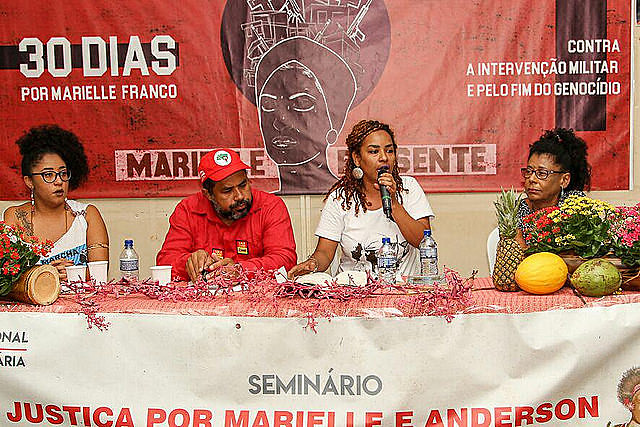The murder of Rio de Janeiro councilwoman Marielle Franco and her driver Anderson Gomes, the military intervention in her hometown, and the genocide against black people in Brazil were not overlooked at the 3rd edition of the National Agrarian Reform Fair, which is taking place in São Paulo.
A discussion panel was held as part of the “Justice for Marielle and Anderson, Against the Military Intervention and Black Genocide” seminar. The event was organized by movements and political organizations for the “30 Days for Marielle” Campaign (#30DiasPorMarielle), which started a month after the humans rights activist from Rio de Janeiro died.
One of the panelists at the seminar was Renata Souza, Marielle’s former chief of staff, who will also run for state representative in Brazil’s coming elections. Souza said the killing of councilwoman Marielle Franco shows how the genocide against black people happens in the country.
“Marielle is a victim of this sexist, racist, lesbophobic society. Marielle was executed with no warning. She was not threatened [prior to her murder] because we, black people, are not threatened. Our existence is already a threat to the system, especially when we take up spaces of power. No one even bothers to threaten us, they just go and kill us. Every day,” she said.
Souza believes Franco’s death has to be constantly addressed as not being an unusual event, but actually as representative of black people’s everyday lives on the outskirts of Brazil.
“Regardless of how far Marielle got, she was still a black woman from the slums. She was murdered just like any other young black person is brutally murdered every day in the hood. This is why we have to keep amplifying her struggle. We have to build an answer by uniting our forces,” she added.
Family
Marielle’s mother, the lawyer Marinete da Silva, also took part in the discussion panel. She talked about how important the many different events, meetings, and tributes to her daughter have been.
“I really thank this family that has emerged with the mobilization after Marielle’s death. It’s hard to talk about her death, it’s very painful. But these movements that are happening can only make us bigger and help us. Marielle didn’t die for herself, but she stood up for other people. She denounced everything, she really did. She was a daring black woman,” she said during the opening of the seminar.
Statistics
The need to build unity among leftist fronts and movements to fight against black genocide was one of the main topics discussed during the seminar. Cida Bento, from the Center for Studies on Labor Relations and Inequality (Centro de Estudos das Relações de Trabalho e Desigualdades – CEERT), said this conversation is imperative.
“We, black people, can be decisive in the presidential election if we can work together. For us, the landless, unemployed, homeless people, the only possibility is to work collectively. We have to keep Marielle’s struggle alive, taking up the parliament with leaders who can stand up for our agenda and our issues,” she said.
The researcher confirmed black people are the most impoverished demographic in Brazil, and are especially impacted in terms of killings and executions.
According to the 2017 Atlas of Violence (Atlas da Violência 2017) published by the Institute for Applied Economic Research (Instituto de Pesquisa Econômica Aplicada – IPEA) and the Brazilian Public Safety and Security Forum (Fórum Brasileiro de Segurança Pública), young, black men with lower levels of education attainment are the main victims of violent death in the country. According to the survey, black people are the majority – around 78% – of the 10% individuals that are more likely to become victims of homicide.
Bia Sankofa from the Leftist Collective Active Power (Coletivo de Esquerda Força Ativa), said these figures are not simply statistics, but they impact the everyday lives of black and poor people, as well as slum residents.
“Every day we are yet another number. We are on the news, surveys, the television, displayed as dead bodies. A 15-year-old black kid from the outskirts is aware he will die, because that is what the State has in stock for them today,” she said.
Genocide and Agrarian Reform
Black genocide is not something that happens only in big cities, but it’s also part of the lives of those who live in rural areas.
João Paulo Rodrigues, from the national board of the Landless Workers’ Movement (Movimento dos Trabalhadores Rurais Sem Terra – MST), said that the murder and criminalization of black people is also common in the countryside.
“It’s even more clear when someone who is political in the countryside is executed. We live in a period where the Brazilian State has been giving the go-ahead for repressive police forces to attack people who take up the struggle, especially black people, landless people, quilombolas [residents of quilombos, settlements set up in Brazil’s rural areas, mostly by escaped enslaved people of African descent]. After the [2016] coup, 106 people have been murdered in rural areas, where killings are selective and targeted. On the outskirts of urban areas, that figure is much greater across Brazil, but always targeting more poor and black people,” he explained.
In Rodrigues’ opinion, land reform can be a way to build black and poor people’s resistance.
“Agrarian reform is a way to solve the problem, as employment and urban reform should be as well. We will only solve the problem if we fight, presenting a real political alternative. Our struggle is not against the police alone, but against the State,” Rodrigues said.




